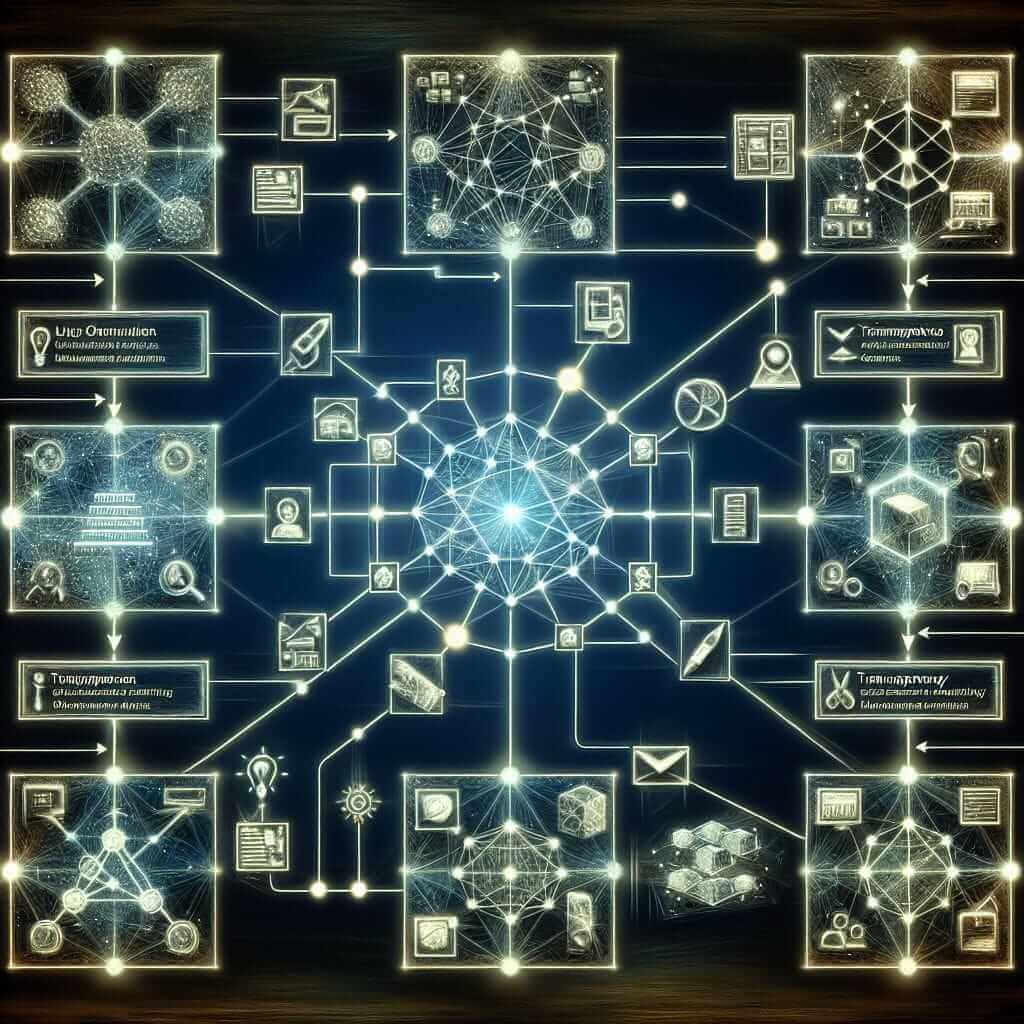The IELTS Reading section is designed to evaluate a broad range of reading skills, from understanding the details to recognizing an author’s arguments and purpose. A recurring theme in IELTS Reading passages is the impact of technology on various sectors. One such pertinent and contemporary topic is “How is blockchain technology influencing supply chain sustainability?”. Given the increasing prominence of blockchain in the tech world and its applications across industries, this theme has high chances of appearance in the IELTS Reading section.
Reading Passage
Medium Text
Blockchain and Supply Chain Sustainability
In recent years, blockchain technology has emerged as a transformative force, particularly in enhancing supply chain sustainability. By fostering transparency, accountability, and efficiency, blockchain addresses some of the critical challenges faced by global supply chains.
One of the primary advantages of blockchain is its ability to improve transparency. Traditionally, supply chains involve numerous intermediaries, making it difficult to trace the origin of products. Blockchain technology allows all stakeholders to access a shared ledger, which records every transaction from the point of origin to the final consumer. This traceability ensures that products are sourced ethically and sustainably.

Moreover, blockchain enhances accountability. Each participant in the supply chain, from manufacturers to retailers, is assigned a unique identifier. Transactions are recorded immutably, reducing the risks of fraud and counterfeiting. For example, in the food industry, blockchain can verify that products meet safety standards, ensuring that consumers receive high-quality goods.
Efficiency is another significant benefit of blockchain technology. Traditional supply chains often suffer from delays due to manual documentation and verification processes. Blockchain automates these processes, reducing lead times and operational costs. Smart contracts, for instance, automatically execute agreements when predefined conditions are met, streamlining operations and enhancing productivity.
Despite these benefits, the integration of blockchain technology into supply chains is not without challenges. Issues such as high implementation costs, energy consumption, and the need for technological expertise can hinder widespread adoption. Nevertheless, as the technology evolves, these challenges are likely to diminish, paving the way for broader acceptance.
In conclusion, blockchain technology holds substantial potential for enhancing supply chain sustainability. By promoting transparency, accountability, and efficiency, it addresses several critical challenges and creates opportunities for more sustainable and resilient supply chains.
Questions
Multiple Choice
-
What is the main advantage of blockchain technology in supply chains according to the passage?
a. Reducing costs
b. Improving transparency
c. Increasing speed of deliveries
d. Simplifying documentation -
How does blockchain ensure the ethical sourcing of products?
a. By reducing operational costs
b. By improving traceability
c. By automating verification processes
d. By reducing the number of intermediaries -
What is one challenge mentioned in the passage regarding the adoption of blockchain technology?
a. Lack of transparency
b. High energy consumption
c. Limited accountability
d. Inefficiency in transactions
True/False/Not Given
- Blockchain technology records transactions immutably.
- Blockchain technology is commonly used in all supply chains globally.
- Smart contracts require manual intervention to execute agreements.
Matching Headings
-
Match the paragraph to the correct heading:
- Paragraph 2: __
- Paragraph 3: __
- Paragraph 4: __
a. Challenges of Blockchain Integration
b. Efficiency in Supply Chains
c. Transparency and Traceability
Answers
Multiple Choice
- b. Improving transparency
- b. By improving traceability
- b. High energy consumption
True/False/Not Given
- True
- Not Given
- False
Matching Headings
-
- Paragraph 2: c. Transparency and Traceability
- Paragraph 3: b. Efficiency in Supply Chains
- Paragraph 4: a. Challenges of Blockchain Integration
Common Mistakes
- Misinterpreting Information: Ensure that you understand the meaning of each statement and how it relates to the passage.
- Overlooking Keywords: Pay attention to keywords in the questions and the passage to help locate relevant information.
- Not Skipping Difficult Questions: If a question is taking too long, skip it and return later to manage your time effectively.
Vocabulary
- Transparency (noun) /ˌtrænsˈpɛrənsi/: the quality of being easily seen through or detected.
- Accountability (noun) /əˌkaʊntəˈbɪlɪti/: the fact or condition of being accountable; responsibility.
- Immutably (adverb) /ɪˈmjuːtə.bli/: in a way that is unable to be changed.
- Intermediaries (noun) /ˌɪntəˈmiːdiəriz/: a person who acts as a link between people in order to try and bring about an agreement or reconciliation.
- Smart Contracts (noun) /smɑːt ˈkɒntræcts/: self-executing contracts with the terms of the agreement directly written into lines of code.
Grammar Focus
- Passive Voice: Used to emphasize the action rather than who performs it. Example: “Each transaction is recorded immutably.”
- Present Perfect Tense: Used to describe actions that have occurred at an unspecified time before now. Example: “Blockchain technology has emerged as a transformative force.”
Advice
- Regular Practice: Consistently practice reading passages to improve speed and comprehension.
- Strategy: Identify and underline key information as you read.
- Simulate Test Conditions: Time your practice sessions to get accustomed to the test environment.
Prepare diligently, practice regularly, and you’ll surely excel in the IELTS Reading section. Good luck!